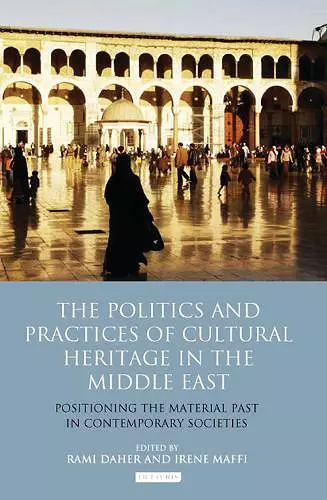The Politics and Practices of Cultural Heritage in the Middle East
Positioning the Material Past in Contemporary Societies
Irene Maffi author Irene Maffi editor Rami Daher editor
Format:Hardback
Publisher:Bloomsbury Publishing PLC
Published:21st Apr '14
Currently unavailable, and unfortunately no date known when it will be back

Unravels the complex processes involved in the definition, production and consumption of heritage and its material culture in the Middle East, and the dynamics of the key actors involved: NGOs, institutions, donor agencies, specialists, investors, individuals, families and the public.
During the nineteenth century, cultural heritage became a dominant feature of the political ideology of the European states and of their colonies. It became a new form of legitimization for the rising nation-state, cementing its inextricable link with that nation's politics and practices. The set of concepts and practices defining cultural heritage were exported to, and imposed over, the colonized populations in North Africa and the Near East. The legacy of the colonial period has proven very significant in the domain of cultural heritage which has become a crucial cultural arena in many Arab states. As in the majorities of post-colonial states, in the Arab world, the inherited paradigm of cultural heritage has been subject to various forms of adaption and re-elaboration that have made it a lively and complex space of negotiations between various actors. Thus, in The Politics of Cultural Heritage in the Middle East, Irene Maffi and Rami Daher draw together expert scholars to unravel these complex processes that are involved in the definition, production and consumption of heritage and its material culture in the Middle East, and the dynamics of the key actors involved.
The variety of the cases analysed that cover the region from Morocco to Lebanon, as well as the multiplicity of the actors concerned such as the state (post-colonial or colonial), international organizations, municipal councils, local communities, families and even exceptional personalities, highlights and explores the complex processes where very local and specific dynamics intertwine with transnational economic, political and cultural fluxes. In its examination of the workings of cultural heritage in the Middle East, this book is an important resource for students and scholars of Middle East Studies, Cultural History, History of Art and Architecture, and for stakeholders involved in the field of cultural heritage.
'The Politics and Practices of Cultural Heritage in the Middle East is an important book that shows how various forms of power, acting at different levels and in different sites, influence in subtle and imperceptible ways the making and sustenance of cultural heritage. It also illustrates how the definition and practices of heritage have always been highly politicised in an already politically hyper region. The book is truly an interdisciplinary one, whose benefits go way beyond the disciplines of its contributors.' Nezar AlSayyad, Professor of Architecture, Planning, Urban Design and Urban History and Chair of the Center for Middle Eastern Studies at UC Berkeley College of Environmental Design 'As archaeological and historical edifices of the past crumble into the dust of contemporary violence in the Middle East, the issues examined by this important volume become more urgent with every passing day. Rami Daher and Irene Maffi examine the politics and practices of what becomes understood as "the material past" at particular times and in particular places. The case studies show how the past is understood, valorised, categorised, preserved and/or destroyed in various countries and settings, urban and rural, domestic and public. These processes illustrate complex outcomes of even more complex forces, which include the ideational, ideological, economic and political goals of a variety of actors from the very local to the global. With its historical, ethnographic and comparative breadth, its important introduction and masterly concluding chapter, this collection is sure to become a standard reference in critical studies of the Middle East region.' Seteney Shami, Arab Council for the Social Sciences and The Social Science Research Council
ISBN: 9781848855359
Dimensions: unknown
Weight: 594g
360 pages